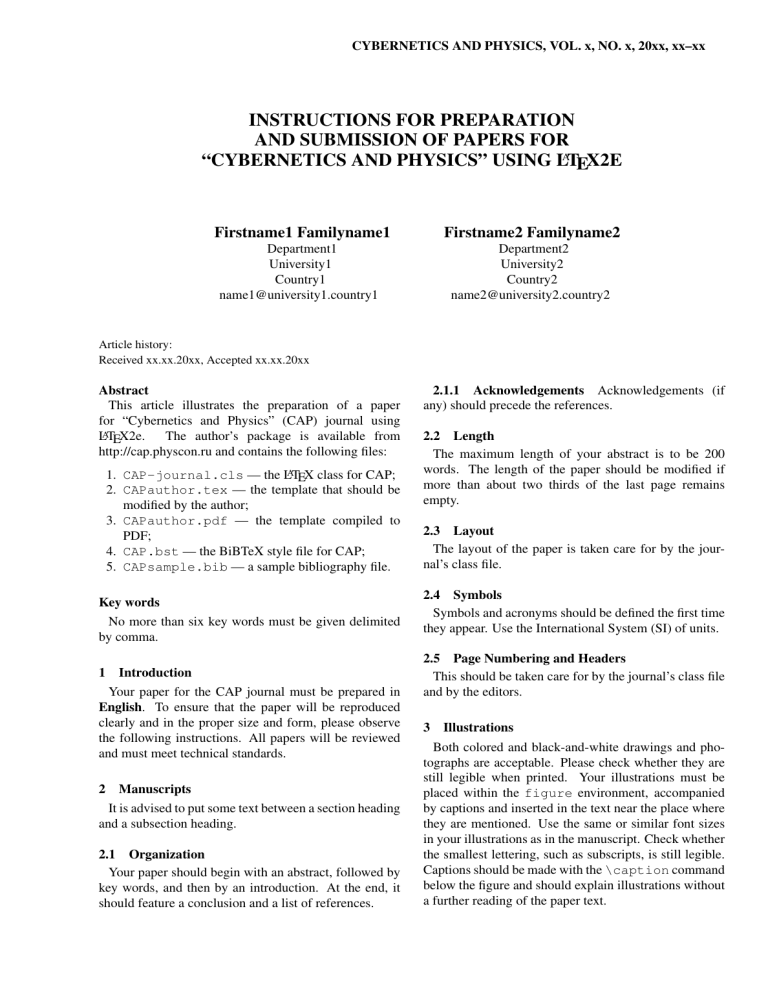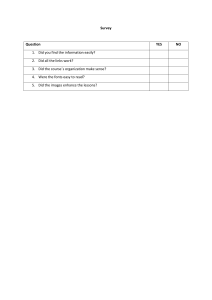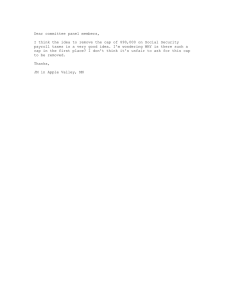
CYBERNETICS AND PHYSICS, VOL. x, NO. x, 20xx, xx–xx
INSTRUCTIONS FOR PREPARATION
AND SUBMISSION OF PAPERS FOR
“CYBERNETICS AND PHYSICS” USING LATEX2E
Firstname1 Familyname1
Firstname2 Familyname2
Department1
University1
Country1
name1@university1.country1
Department2
University2
Country2
name2@university2.country2
Article history:
Received xx.xx.20xx, Accepted xx.xx.20xx
Abstract
This article illustrates the preparation of a paper
for “Cybernetics and Physics” (CAP) journal using
LATEX2e.
The author’s package is available from
http://cap.physcon.ru and contains the following files:
1. CAP-journal.cls — the LATEX class for CAP;
2. CAPauthor.tex — the template that should be
modified by the author;
3. CAPauthor.pdf — the template compiled to
PDF;
4. CAP.bst — the BiBTeX style file for CAP;
5. CAPsample.bib — a sample bibliography file.
Key words
No more than six key words must be given delimited
by comma.
1
Introduction
Your paper for the CAP journal must be prepared in
English. To ensure that the paper will be reproduced
clearly and in the proper size and form, please observe
the following instructions. All papers will be reviewed
and must meet technical standards.
2
Manuscripts
It is advised to put some text between a section heading
and a subsection heading.
2.1 Organization
Your paper should begin with an abstract, followed by
key words, and then by an introduction. At the end, it
should feature a conclusion and a list of references.
2.1.1 Acknowledgements Acknowledgements (if
any) should precede the references.
2.2 Length
The maximum length of your abstract is to be 200
words. The length of the paper should be modified if
more than about two thirds of the last page remains
empty.
2.3 Layout
The layout of the paper is taken care for by the journal’s class file.
2.4 Symbols
Symbols and acronyms should be defined the first time
they appear. Use the International System (SI) of units.
2.5 Page Numbering and Headers
This should be taken care for by the journal’s class file
and by the editors.
3
Illustrations
Both colored and black-and-white drawings and photographs are acceptable. Please check whether they are
still legible when printed. Your illustrations must be
placed within the figure environment, accompanied
by captions and inserted in the text near the place where
they are mentioned. Use the same or similar font sizes
in your illustrations as in the manuscript. Check whether
the smallest lettering, such as subscripts, is still legible.
Captions should be made with the \caption command
below the figure and should explain illustrations without
a further reading of the paper text.
2
CYBERNETICS AND PHYSICS, VOL. x, NO. x, 20xx
\usepackage{epstopdf}
Beautiful Figure
to the preamble.
Figure 1.
8
An example figure.
4
Tables
For tables use the table environment. Unlike figures,
the caption should precede the table.
Table 1.
Example of a table
T
k
0.20
3.8
0.30
2.4
0.35
2.0
Fonts
To maintain the same look when viewing or printing
your paper on another machine, all the fonts used in the
PDF file must be embedded or subset embedded. All the
fonts used in the text must be Type 1.
This is easily attained by compiling your LATEX file
with the pdflatex command.
No unembedded fonts are allowed. Type 3 (bitmapped)
fonts are allowed only in graphics. Please check the
compliancy of your file before submission by using the
menu item
File/Properties/Fonts
in Adobe Reader.
9
5
Equations
Displayed equations should be centered like in the example given below:
∂B
∂t
∂D
∇×H =J +
∂t
Paper Submission
Your paper should be uploaded through Submission
site http://cap.physcon.ru in PDF format.
Faxed and emailed submissions will not be accepted.
Upon acceptance of the paper you will be requested to
submit the source files too.
10
∇×E =−
(1)
Conclusion
If necessary, they should be numbered on the right side.
A carefully prepared manuscript that is acceptable
without modification will make a better presentation of
your work and spare us unnecessary delay in editing the
papers.
6
Acknowledgements
Bibliography
List all bibliographical references at the end of the paper in the manner shown (listing in alphabetic order with
respect to last name of first author). Refer to them in
the text as follows: [Wang et al., 2002] and [Paul, 1992;
Sato, 1989].
The usage of BibTeX is highly recommended. The author’s package contains the journal’s style file CAP.bst
and a sample bibliography file CAPsample.bib. For
BibTeX add the command
\bibliography{your bib-file}
to the end of your document.
7
Compilation
It might occur that the paper size is incorrect when
compiling to a pdf-file (the text falls partly off the page).
To avoid this problem it is highly recommended to use
the pdflatex command for compilation
pdflatex filename.tex
If you have figures in the EPS format, either convert
them to PDF, or add
This template was updated in 2019 by Alexander N.
Churilov, St. Petersburg State University, Russia, from
the template prepared for ENOC 2005, Eindhoven by
Remco I. Leine, Center of Mechanics IMES, ETH. Modified for CAP journal based on experience of PhysCon
conferences.
References
Paul, C. R. (1992). Introduction to Electromagnetic
Compatibility. Wiley-Intersciences, New York.
Sato, R. (1989). EMC — The past, present and future.
In Proc. Int. Symp. Electromagn. Compat., Nagoya,
Japan, Sept. 8–10, pp. 1–9.
Wang, J., Sasabe, K., and Fujiwara, O. (2002). A simple
method for predicting common-mode radiation from a
cable attached to a conducting enclosure. IEICE Trans.
Commun., E85-B (7), pp. 1360–1367.
Appendix A Head of an Appendix
Avoid using appendices.

